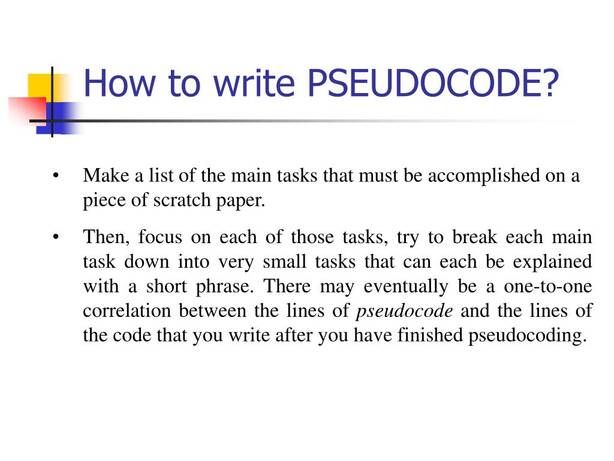Upgrade & Secure Your Future with DevOps, SRE, DevSecOps, MLOps!
We spend hours on Instagram and YouTube and waste money on coffee and fast food, but won’t spend 30 minutes a day learning skills to boost our careers.
Master in DevOps, SRE, DevSecOps & MLOps!
Learn from Guru Rajesh Kumar and double your salary in just one year.
computer packages are written for device analyzing. We have to write them in a sure format with the intention to be compiled for the gadget to understand. however frequently those written codes are not clean to comply with for human beings other than programmers. in order to show those codes in an casual way so that humans can also recognize, we prepare pseudocode. though it isn’t always an actual programming language code, pseudocode has comparable structural conventions of a programming language. seeing that pseudocode does now not run as a real program, there may be no fashionable way of writing a pseudocode. we are able to comply with our personal way of writing a pseudocode.
here is the pseudocode for our set of rules to find a book:
Algorithm FindABook(L,book_name)
Input: list of Books L & name of the search book_name
Output: False if not found or position of the book we are looking for.
if L.size = 0 return null
found := false
for each item in L, do
if item = book_name, then
found := position of the item
return found Now, allow us to observe the pseudocode we’ve got written. we’re supplying a list of books and a call that we are looking. we’re walking a foreach loop to iterate each of the books and matching with the e-book call we’re looking. If it’s far located, we’re returning the location of the ebook in which we observed it, false in any other case. So, we’ve written a pseudocode to discover a e-book name from our ebook list. however what about the other remaining books? How will we retain our search until all books are located and placed at the proper shelf?:
Algorithm placeAllBooks
Input: list of Ordered Books OL, List of received books L
Output: nothing.
for each book_name in OL, do
if FindABook(L,book_name), then
remove the book from the list L
place it to the bookshelf changing pseudocode to actual code
We are now going to convert our pseudocodes to actual PHP 7 codes as shown:
allow us to now understand what is happening inside the preceding code. First we’ve defined a new characteristic, findABook at the start of the code. The function is described with parameters. One is Array $bookList and the alternative is String $bookName. At the beginning of the characteristic we’re initializing the $found to false, this means that not anything has been discovered but. The foreach loop iterates via the ebook list array $bookList and for every e-book, it fits with our supplied ebook name $bookName. If the e-book call that we are seeking out fits with the book inside the $bookList, we’re assigning the index (where we discovered the fit) to our $discovered variable. on account that we have found it, there is no point in continuing the loop. So, we’ve used the break command to get out of the loop. just out of the loop we’re returning our $determined variable. If the ebook was located, typically $discovered will return any integer value extra than 0, else it’s going to return fake:
This precise function placeAllBooks surely iterates thru our ordered books $orderedBooks. we are iterating our ordered e book list and looking each e-book in our delivered listing the use of the findABook function. If the e-book is discovered in the ordered list ($bookFound !== false), we’re putting off that ebook from the added e book listing the use of the array_splice() function of Hypertext Preprocessor:
those strains truly indicates Hypertext Preprocessor arrays which are used for the list of books we have obtained, $bookList and the list of books we’ve without a doubt ordered $orderedBooks. we’re simply using some dummy facts to test our implemented code as shown:
The ultimate a part of our code genuinely calls the characteristic placeAllBooks to carry out the whole operation of checking each e book searching for it in our obtained books and getting rid of it, if it’s miles inside the listing. So essentially, we have applied our pseudocode to an actual php code which we are able to use to solve our trouble.

 Starting: 1st of Every Month
Starting: 1st of Every Month  +91 8409492687 |
+91 8409492687 |  Contact@DevOpsSchool.com
Contact@DevOpsSchool.com